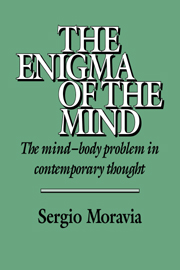Book contents
- Frontmatter
- Contents
- Preface to the English edition
- The enigma of the mind
- The enigma of the mind: Introduction to a metaphor
- 1 Toward a physical science of the mental: Feigl and the (re-)construction of the ‘mind–body problem’
- 2 The apogee of physicalism: The identity theory and materialism in the Australian school
- 3 The obscure relationship: Problems and debates surrounding the identity theory
- 4 Psychology as alchemy: The elimination of the mental in the ‘disappearance theory’
- 5 The mind as function: The functionalist approach to the mind–body problem
- 6 The mind as property and as event: The ‘reformist’ neo-identityism of Kim and Davidson
- 7 The mind as language: The linguistic turn in the mind–body problem
- 8 Speaking in many different ways: The pluralization of descriptions and explanations in the MBP
- 9 The mind as a mode of subjective experience: An interpretive model of the features of the mental
- 10 The mind as ‘subject’ and as ‘being-in-the-world’: Toward a non-mentalistic interpretation of the mental
- Appendix The mental as intentional/‘personal’ emergence: The psycho-personological perspective of Joseph Margolis
- Bibliography
- Name index
9 - The mind as a mode of subjective experience: An interpretive model of the features of the mental
Published online by Cambridge University Press: 05 June 2012
- Frontmatter
- Contents
- Preface to the English edition
- The enigma of the mind
- The enigma of the mind: Introduction to a metaphor
- 1 Toward a physical science of the mental: Feigl and the (re-)construction of the ‘mind–body problem’
- 2 The apogee of physicalism: The identity theory and materialism in the Australian school
- 3 The obscure relationship: Problems and debates surrounding the identity theory
- 4 Psychology as alchemy: The elimination of the mental in the ‘disappearance theory’
- 5 The mind as function: The functionalist approach to the mind–body problem
- 6 The mind as property and as event: The ‘reformist’ neo-identityism of Kim and Davidson
- 7 The mind as language: The linguistic turn in the mind–body problem
- 8 Speaking in many different ways: The pluralization of descriptions and explanations in the MBP
- 9 The mind as a mode of subjective experience: An interpretive model of the features of the mental
- 10 The mind as ‘subject’ and as ‘being-in-the-world’: Toward a non-mentalistic interpretation of the mental
- Appendix The mental as intentional/‘personal’ emergence: The psycho-personological perspective of Joseph Margolis
- Bibliography
- Name index
Summary
CHARACTERIZING THE MENTAL: SOME CRITIQUES OF THE MIND AND ITS TRADITIONAL ARTICULATION
“There is”, a keen student of intentionality has remarked, “a growing body of opinion to the effect that mentalistic notions like thinking, believing and desiring belong to a primitive folk-theory which is either incoherent or false, or in some other way flawed” (Woodfield 1982, p. x). The scope of this observation should be extended. The movement of opinion Woodfield refers to actually includes not only some concepts belonging to the sphere of the mental, but the whole of the mental as such. Indeed the dimension of the ‘mind’, assailed from all sides by a certain brand of neo-physicalism, by recent versions of biologism (such as the sociobiology of E. O. Wilson), and by computer science and artificial intelligence, risks an eclipse similar to that which occurred during the heyday of behaviorism.
It must not be supposed, however, that all contemporary philosophers of mind have passively accepted this situation. On the contrary, many have shown that they have no intention of considering the game over so soon. Well aware that certain conceptions of the mind cannot be salvaged, some scholars have expressed the need for new interpretive models to represent the mental dimension. What are, Kim once asked, the “criteria” of the mental (Kim 1971)? What are, came the echo from another theoretical shore, the “marks” of the mental-subjective-conscious universe (Rorty 1970b)? The mind, Herbst had stressed even earlier, must not be replaced (and much less eliminated): it is to be “characterized” anew (Herbst 1967).
- Type
- Chapter
- Information
- The Enigma of the MindThe Mind-Body Problem in Contemporary Thought, pp. 206 - 235Publisher: Cambridge University PressPrint publication year: 1995



